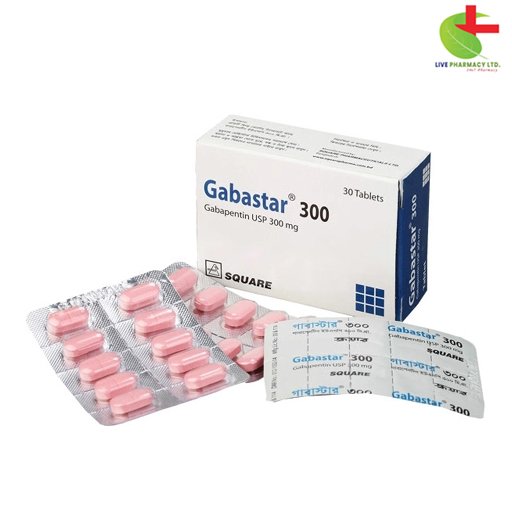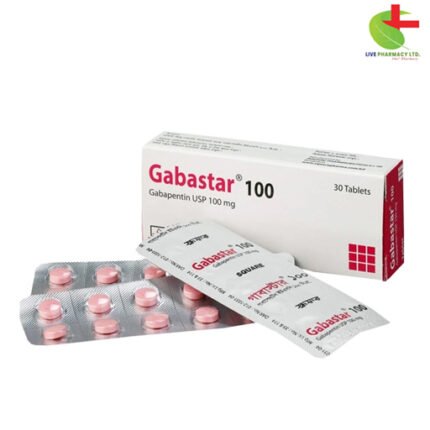Gabastar 300
161.10৳ Strip
- Gabastar: Effective for neuropathic pain and adjunctive therapy in seizures
- Powered by gabapentin, an anti-convulsant and structural analog of GABA
- Modulates calcium channels and neurotransmitter release
- Tailored dosages for varied conditions ensure optimal relief
- Administered orally for safe and effective management
 Brand
Brand
|
Square Pharmaceuticals PLC |
|---|---|
 Generics
Generics
|
Gabapentin |
Indications
Gabastar serves as a treatment for:
- Neuropathic Pain
- Adjunctive therapy in partial seizure and secondary generalized seizure.
Pharmacology
Gabapentin, an anti-convulsant, functions as a structural analog of gamma-amino-butyric-acid (GABA). Its pharmacological actions stem from the parent compound’s activity. Gabapentin binds to the alpha-2-delta subunit of voltage-gated L-type Calcium channels, inhibiting branched chain amino acid transferase, and potentially restraining neurotransmitter release of excitatory amino acids.
Dosage
For Neuropathic Pain: Initiate treatment with a single 300 mg dose on Day-1, followed by 300 mg twice on Day-2 and 300 mg thrice on Day-3. Adjust the dose as needed for pain relief, up to a daily dose of 1800 mg (divided TID).
For Epilepsy:
- Patients over 12 years: Effective dose ranges from 900 to 1800 mg/day in three divided doses, starting with 300 mg three times daily.
- Pediatric patients age 3-12 years: Begin with 10-15 mg/kg/day in 3 divided doses, titrating upward over approximately three days.
- Follow medical advice when administering medication.
Administration
Gabapentin can be taken orally, with or without food.
- Follow medical advice when administering medication.
Interaction
Antacids may reduce Gabastar’s bioavailability by up to 20%. Cimetidine may affect its renal excretion. Gabastar does not interact with other anti-epileptic drugs or oral contraceptive preparations.
Contraindications
Gabapentin should not be used in patients with known hypersensitivity to the drug.
Side Effects
Possible side effects include fatigue, dizziness, ataxia, weight gain, peripheral edema, dry mouth, and somnolence.
Pregnancy & Lactation
Gabapentin falls under Pregnancy category C. Use during pregnancy is recommended only if potential benefits outweigh the risks to the fetus. Gabapentin may be excreted through breast milk; thus, its use during lactation should be carefully considered.
Precautions & Warnings
Patients should strictly adhere to the prescribed dosage. They should refrain from driving or operating machinery until they understand how Gabastar affects their mental and motor functions.
Use in Special Populations
Dosages of Gabastar should be reduced in patients with renal impairment.
Therapeutic Class
Gabastar belongs to the class of adjunct anti-epileptic drugs.
Storage Conditions
Store below 25°C, protected from light and moisture. Keep all medicines out of reach of children.













Reviews
There are no reviews yet.